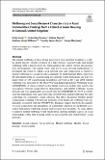Files in this item
Wellbeing and social network characteristics in rural communities : findings from a cohort in social housing in Cornwall, United Kingdom
Item metadata
| dc.contributor.author | Long, Emily | |
| dc.contributor.author | Stevens, Sebastian | |
| dc.contributor.author | Topciu, Raluca | |
| dc.contributor.author | Williams, Andrew James | |
| dc.contributor.author | Taylor, Timothy | |
| dc.contributor.author | Morrissey, Karyn | |
| dc.date.accessioned | 2022-05-20T08:30:02Z | |
| dc.date.available | 2022-05-20T08:30:02Z | |
| dc.date.issued | 2022-05-19 | |
| dc.identifier | 279510229 | |
| dc.identifier | a1d4acfc-49ac-4a51-a9bc-5820442deacd | |
| dc.identifier | 85169096671 | |
| dc.identifier.citation | Long , E , Stevens , S , Topciu , R , Williams , A J , Taylor , T & Morrissey , K 2022 , ' Wellbeing and social network characteristics in rural communities : findings from a cohort in social housing in Cornwall, United Kingdom ' , International Journal of Community Well-Being , vol. First Online . https://doi.org/10.1007/s42413-022-00167-5 | en |
| dc.identifier.issn | 2524-5309 | |
| dc.identifier.other | ORCID: /0000-0002-2175-8836/work/113399086 | |
| dc.identifier.uri | https://hdl.handle.net/10023/25419 | |
| dc.description | Funding: The Smartline project (www.smartline.org.uk, based in Cornwall, UK) received £6,930,810 of funding from the England European Regional Development Fund (Grant Numbers 05R16P00305, 05R18P02819) as part of the European Structural and Investment Funds Growth Programme 2014-2020. The Smartline project is also funded by the South West Academic Health Science Network, Cornwall Council, and Her Majesty (HM) Government, and is a partnership between University of Exeter, Coastline Housing, Volunteer Cornwall, Cornwall Council, and the South West Academic Health Science Network. | en |
| dc.description.abstract | Background: The mental wellbeing of those living in resource poor and rural localities is a public health priority. Despite evidence of a link between social networks and mental wellbeing, little is known about this relationship in the context of rural and resource poor environments. The current study uses novel social network methodology to investigate the extent to which social network size and composition is related to mental wellbeing in a social housing community in rural England. Methods: Data come from 88 individuals living in social housing in Cornwall. These participants are part of a larger study of 329 social housing households surveyed in 2017 and 2018. Mental wellbeing was measured by the Short Warwick-Edinburgh Mental Wellbeing Scale (SWEMWBS). A series of multivariable linear regression models were used to test associations between social network characteristics and mental wellbeing. Results: Social network size was significantly associated with the SWEMWBS (b = 0.39, p < 0.01), such that individuals with larger networks reported better mental wellbeing, but after controlling for community social cohesion, this effect dissipated. Neither gender composition or talking with network members about health and wellbeing were significantly associated with the SWEMWBS. Conclusions: Findings suggest that both the quantity of social connections and perceptions of community cohesion are moderately associated with mental wellbeing in rural and resource poor localities. As such, efforts to improve mental wellbeing would benefit from targeting multiple aspects of social relationships, rather than focusing solely on increasing the size of individuals’ social networks. | |
| dc.format.extent | 12 | |
| dc.format.extent | 816823 | |
| dc.language.iso | eng | |
| dc.relation.ispartof | International Journal of Community Well-Being | en |
| dc.rights | Copyright © The Author(s) 2022. This article is licensed under a Creative Commons Attribution 4.0 International License, which permits use, sharing, adaptation, distribution and reproduction in any medium or format, as long as you give appropriate credit to the original author(s) and the source, provide a link to the Creative Commons licence, and indicate if changes were made. The images or other third party material in this article are included in the article’s Creative Commons licence, unless indicated otherwise in a credit line to the material. If material is not included in the article’s Creative Commons licence and your intended use is not permitted by statutory regulation or exceeds the permitted use, you will need to obtain permission directly from the copyright holder. To view a copy of this licence, visit http://creativecommons.org/licenses/by/4.0/. | en |
| dc.subject | Social cohesion | en |
| dc.subject | Social network | en |
| dc.subject | Mental wellbeing | en |
| dc.subject | Health | en |
| dc.subject | Social housing | en |
| dc.subject | Social capital | en |
| dc.subject | HV Social pathology. Social and public welfare | en |
| dc.subject | RA0421 Public health. Hygiene. Preventive Medicine | en |
| dc.subject | 3rd-DAS | en |
| dc.subject | SDG 3 - Good Health and Well-being | en |
| dc.subject.lcc | HV | en |
| dc.subject.lcc | RA0421 | en |
| dc.title | Wellbeing and social network characteristics in rural communities : findings from a cohort in social housing in Cornwall, United Kingdom | en |
| dc.type | Journal article | en |
| dc.contributor.institution | University of St Andrews.Population and Behavioural Science Division | en |
| dc.contributor.institution | University of St Andrews.School of Medicine | en |
| dc.identifier.doi | 10.1007/s42413-022-00167-5 | |
| dc.description.status | Peer reviewed | en |
This item appears in the following Collection(s)
Items in the St Andrews Research Repository are protected by copyright, with all rights reserved, unless otherwise indicated.

